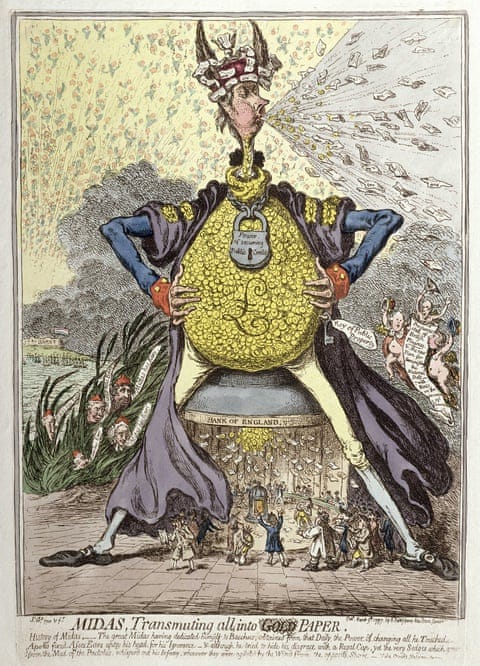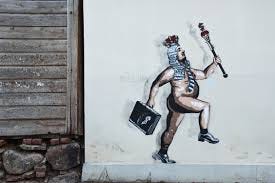What exactly is the point of satire?
If satire doesn't change anything in this new land of confusion, should we just stop bothering to create it?

‘Real life is putting satire out of business isn’t it?’
So said a Newstalk interviewer recently when speaking about Trump with Armando Iannucci. Iannucci, the darkly satirical writer behind ‘In the Loop,’ ‘The Thick of It,’ ‘Veep’ and the film ‘The Death of Stalin’ has made similar comments himself in the past.
You can see where they are coming from. Satirists like Gillray in the cartoon above made jokes about the economy, but what if satire itself has become devalued?
Imagine the task a satirist has now. He or she is in an impossible situation. They’re reading the ‘Emperor’s New Clothes’ and getting to the bit where the idiot is walking through the streets with only his birthday suit on. Someone is about to point out the obvious. Except now there’s a problem. One they never expected.
Suddenly the emperor is pointing at his own smelly bits with pride. He is screaming ‘Look at them! They’re bigger and hairier than everyone else’s. Hey everyone! Let’s all get naked!’

This is the fairy tale turned horror story we are seeing being played out in America. In this version of the story, there’s not exactly a need for a small child to point out the absurdity of the spectacle taking place before our eyes. Half the supposed grown-ups have not only been sucked into believing he looks marvellous despite wearing no underpants, but they are now taking their own clothes off too. Everyone is breaking the rules and loving it.
For who needs Truth, Decorum, Decency, Bravery, Reason, Justice or Humanity when you can just strip off these tiresome garments like uncomfortable g-strings, and fling them to the floor, while the rest of America (and the world) is subjected to a For Your Eyes Only show it never wanted to watch? But no-one does grubby quite as well as your Commander Without Briefs. (Though in the UK, Partygate Johnson tried hard to outdo him and being shown up for breaking the rules wasn’t something which remotely bothered him either).
So what then is the point in satire when your politicians feel no shame? When the President himself is a convicted felon who openly signs executive orders which he has no power to make, and he actively delights in being a maverick who doesn’t give a damn about rules? What is left to expose when the rule-breakers are so shameless that they are no longer even trying to hide what they’re doing?
Does this mean we have to change how we do satire? Iannucci suggests the way it used to be done was part of a ‘a bygone era.’
In the interview, he gets quite close to conceding that Satire’s previous function to reveal that politicians are breaking the rules, is now becoming redundant. We need to view it in a different light now.
I haven’t fully worked through what that will be. But I do know that satire and democracy go hand-in-hand with one another. They are non-identical twins who were born together and grew up together. Satire was even present in society during the very first democracy. The Ancient Athenian playwright Aristophanes lampooned the hawkish politician Cleon in more than one of his plays. We know that other comedians did too.
Aristophanes’ play ‘The Knights’ insults Cleon throughout. It portrays him as a nouveau-riche demagogue who flatters people in the assembly by telling them whatever they want to hear, as if they were his lover. (Aristophanes also accuses him of corruption, persecuting his opponents and making huge mistakes when it comes to foreign affairs).
But his satire didn’t always have the power to change his world. Despite Aristophanes lampooning Cleon in ‘The Knights’, and despite it winning first prize at the Lenaea festival in 424 BC, Cleon was still elected again as one of the ten generals just a few months later.
Similarly, Alec Baldwin’s brilliant impersonations of Donald Trump didn’t stop the latter from getting elected again either. Has America reached the stage where political reality has now overtaken comedy ? Whether you believe that satire can influence public opinion or not, you know there is a definite problem when there is nowhere left to go to find hyperbole, because real life has stolen it from the satirist. When the whole world has become a Hall of Mirrors, the subjects peering into the mirrors look just as grotesque and contorted as any images which could possibly be manufactured.
And yet I loved last night’s Saturday Night Live sketch. It can perhaps be summed up as ‘Terrible Tariffs and Tanking Tesla’. People who understand Economics (Americans as much as non-Americans) are clearly worried that nothing good will come from tariffs1 and that they are bound to lead to the price of food for ordinary Americans going up.
As for Tesla, it would be hard to think of anyone in the public eye who is more reviled or ridiculed than Elon Musk is right now. But even the kindest soul, who would normally balk at the idea of laughing at another’s misfortune, would find it challenging to stop himself from chuckling at the Mike Myers’ sketch about the self-destructive Tesla car. Musk made his own bed, likely ruined the lives of millions of Americans in the process and can go ahead and lie in his own muck now.
But still, I sometimes ask myself, what is the point in satirising these people? Is it going to change anything? Is the point just to provide some much needed comic relief, because if we don’t try to look at the funny side of things sometimes, then the alternative will be to weep?
As a child, one of the first satirists I was exposed to was Punch. Until a recent trip to a Punch & Judy festival in Covent Garden in London, I confess I didn’t associate the wife-beating murderous sausage-loving puppet with incisive political commentary. But those who were more knowledgable than me explained that Punch was an anarchic and rebellious figure. He represented a challenge to the social order.
Punch was symbolic. He grew to prominence in the 17th century in the years after the Civil War in England. The diarist Samuel Pepys himself watched an early Punch & Judy show and wrote about it in 1662. As democracy evolved once again, this time in parts of Western Europe, so did figures like Punch. This time it was a representative democracy, rather than a direct democracy, which was under attack. Punch fought the establishment hard. He fought the police-men, he fought the judges and he fought the hang-men too. And Punch always won. He was never defeated.
Talking of political puppetry, someone here on Substack recently posted a music video involving a more modern variety. Well not exactly modern perhaps, but 40 year old puppets rather than 400 year old ones. It was a clip of the Genesis soundtrack ‘Land of Confusion.’ The song was recorded in the 1980s, but aptly evoked the spirit we are living in now:
Back then they used the puppets to try to make sense of the uncertainty of the Cold-War era of the 1980s. They even explored issues like the nuclear button. Perhaps comedy is the best forum to explore a subject as heavy as this. Stanley Kubric, the writer of Dr Strangelove, clearly felt this way too. (Iannucci has incidentally just directed Steve Coogan in a performance of Dr Strangelove at the National Theatre in London. Cinemas are still showing the performance here and they have been showing them recently in New York too. If you missed it, you should be able to catch it soon online via the National Theatre’s website).
The most confusing and tumultous times for the comic Aristophanes were probably the months between 404BC and 403 BC. Up to 1500 Athenian citizens were murdered during a bloodthirsty coup when the democracy was overturned and replaced by the rule of a band of 30 oligarchs imposed by Sparta. Unsurprisingly perhaps, we have no evidence at all of any comedies being performed in Athens during this year. But in 403 BC, the democracy was restored and Aristophanes started to write his plays again.
So maybe that is the most important thing to remember when it comes to satire. Even when we are feeling at our most pessimistic about its power to do anything to change the world we are living in, we can always agree on this at least: Satire is a touchstone. If satire is still with us, then so is democracy, even if it feels as though it is just hanging on by a tiny thread.
When we are still allowed to speak freely and make fun of those in power with impunity, then we know that there is some vestige of that democracy left. So we must never stop satirising those in power, even if it means having to keep changing how we go about performing satire.
Satire is a litmus test. A marker of whether we still have an open society or not. And for that alone satire will always be worth its weight in gold.
If you enjoyed this article, please like, re-stack, subscribe for free or consider upgrading to a paid subscription.
I’ll be sharing more about my novel soon too.
Thank you,
Joanna
Just one example is the fact that there will be counter measures and reactive tariffs on imports like potash, which is critical for making fertiliser (80% of it up until now has come from Canada) : https://uk.marketscreener.com/quote/stock/NUTRIEN-LTD-40177871/news/Nutrien-warns-tariffs-will-hurt-U-S-farmers-who-rely-on-Canadian-potash-49117105/



